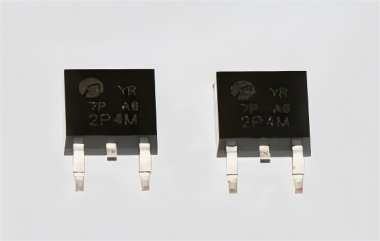
In the modern electronic components industry, the MOSFET Controlled Thyristor is emerging as a next-generation power semiconductor device. With its superior performance and wide range of applications, it is gradually becoming the focal point in the high-power switching sector. By combining the advantages of both MOSFETs and thyristors, MCT enables efficient and fast current control, making it highly versatile across various fields such as power electronics, renewable energy, and household appliances. This article will provide a detailed introduction to the definition, working principle, features and advantages, and key applications of MCT.
Catalog
I. What is MCT?
The MOSFET Controlled Thyristor (MCT) is a semiconductor device that combines the characteristics of Metal-Oxide-Semiconductor Field-Effect Transistors (MOSFETs) and traditional thyristors. It integrates the fast switching control capabilities of MOSFETs with the high current handling capacity of thyristors, which makes it an outstanding choice for high-power and high-voltage applications. The core advantage of MCT lies in its ability to trigger and control the conduction and turn-off of the thyristor through the gate of the MOSFET, offering more flexible control in power systems.
II. Working Principle
The working principle of MCT combines the characteristics of both MOSFETs and thyristors. The basic structure includes a MOSFET and a PNPN-type thyristor. In simple terms, the MOSFET is used to control the conduction and turn-off of the thyristor. Specifically:
· Conduction: When a positive voltage is applied to the gate of the MCT, the MOSFET turns on, triggering the conduction of the PNPN-type thyristor and allowing current to flow through the load. At this point, the MCT operates similarly to a traditional thyristor, capable of handling high currents.
· Turn-off: By controlling the voltage on the gate, the MOSFET turns off, cutting off the positive feedback of the PNPN thyristor, causing the MCT to enter the off state and halting current flow.
This control mechanism allows MCTs to switch rapidly in high voltage and high current environments while maintaining efficient switching performance.
III. Features and Advantages
· High Voltage and Current Handling: MCTs can withstand blocking voltages up to 3000V and peak currents of 1000A, making them suitable for high-voltage, high-power applications.
· Low Conduction Voltage Drop: The conduction voltage drop of MCT is around 11V, which is only about one-third of that of GTRs (Gate Turn-Off Thyristors), reducing conduction losses.
· Fast Switching Characteristics: MCTs have an on-time of around 200ns and a rapid turn-off ability, making them ideal for high-frequency switching applications.
· High dv/dt and di/dt Tolerance: MCTs can withstand dv/dt up to 20kV/μs and di/dt up to 2kA/μs, enhancing the system’s resistance to interference.
· High Input Impedance and Low Drive Power: Thanks to the MOSFET control, MCTs have high input impedance and low drive power, simplifying the design of drive circuits.
IV. Applications
MCTs are widely used in the following fields:
· Power Electronics: MCTs are used in devices like variable frequency drives, uninterruptible power supplies (UPS), and DC motor drives to achieve efficient power conversion and control.
· Power Systems: In high-voltage direct current (HVDC) transmission and power grids, MCTs play a key role in power control, improving power transmission efficiency and stability.
· Home Appliances: MCTs are used in large household appliances, such as air conditioners and refrigerators, for efficient power conversion and regulation.
· Renewable Energy: In solar inverters, wind turbine controls, and other renewable energy systems, MCTs are used for efficient energy conversion and control.
V. Conclusion
As a next-generation, high-efficiency power switching device, the MOSFET Controlled Thyristor (MCT) demonstrates a broad range of applications across industries such as power electronics, renewable energy, and electric vehicles. With its high current handling capacity, low conduction voltage, fast switching characteristics, and high voltage tolerance, MCT holds significant promise for the future. As technology continues to advance, the scope of MCT's applications will expand, positioning it as a critical component in modern power electronic systems.




